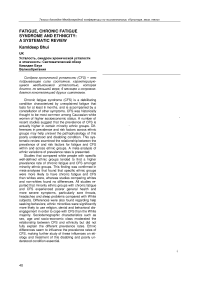Усталость, синдром хронической усталости и этничность: систематический обзор
Автор: Камлдип Бхуи
Журнал: Сибирский вестник психиатрии и наркологии @svpin
Рубрика: Тезисы докладов международной конференции по психоонкологии "Культура, мозг, тело"
Статья в выпуске: 3 (50), 2008 года.
Бесплатный доступ
Синдром хронической усталости (CFS) - это подрывающее силы состояние, характеризующееся необъяснимой усталостью, которая длится, по меньшей мере, 6 месяцев и сопровождается констелляцией других симптомов.
Короткий адрес: https://sciup.org/142100747
IDR: 142100747
Текст статьи Усталость, синдром хронической усталости и этничность: систематический обзор
Синдром хронической усталости (CFS) – это подрывающее силы состояние, характеризующееся необъяснимой усталостью, которая длится, по меньшей мере, 6 месяцев и сопровождается констелляцией других симптомов.
Chronic fatigue syndrome (CFS) is a debilitating condition characterized by unexplained fatigue that lasts for at least 6 months, and is accompanied by a constellation of other symptoms. CFS was historically thought to be most common among Caucasian white women of higher socioeconomic status. A number of recent studies suggest that the prevalence of CFS is actually higher in certain minority ethnic groups. Differences in prevalence and risk factors across ethnic groups may help unravel the pathophysiology of this poorly understood and disabling condition. This systematic review examined the relationship between the prevalence of and risk factors for fatigue and CFS within and across ethnic groups. A meta-analysis of ethnic variations of prevalence rates is presented.
Studies that compared white people with specific well-defined ethnic groups tended to find a higher prevalence rate of chronic fatigue and CFS amongst minority ethnic groups. This finding was confirmed in meta-analyses that found that specific ethnic groups were more likely to have chronic fatigue and CFS than whites were, whereas studies comparing whites and non-whites found no differences. All studies reported that minority ethnic groups with chronic fatigue and CFS experienced poorer general health and more severe symptoms, particularly sore throats, headaches and sleep problems compared with White subjects. Differences were also found regarding help seeking behaviors; ethnic minorities were significantly more likely to use religion, denial and behavioral disengagement in order to cope with CFS than the White majority. Sociodemographic characteristics such as sex, age and socio-economic class moderated the relationship between CFS and ethnicity but did not fully explain the different prevalence rates. Ethnic differences seem to influence the prevalence rates of CFS, making further study of these influences on etiology and treatment of this disabling and poorly understood condition essential.
i


